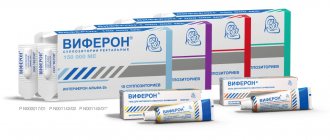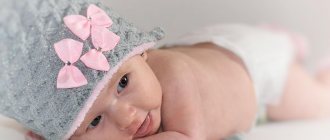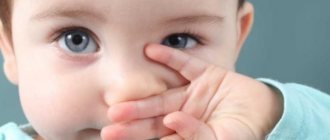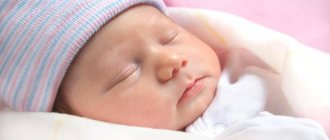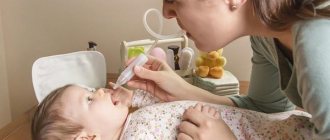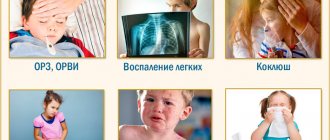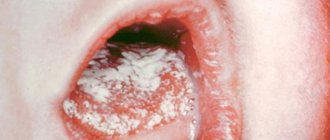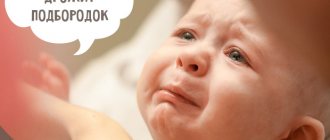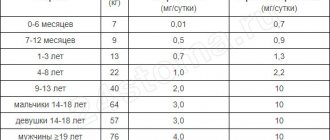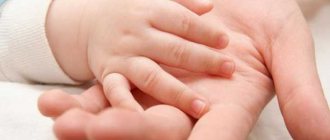Causes of coughing in infants
Snot and cough in infants are constant companions of respiratory infections. However, they do not always indicate pathology. In some cases, these symptoms are temporary and go away on their own.
A doctor can determine the exact cause of their occurrence, so parents should first contact him.
Norm
If a baby develops a runny nose and cough without fever, especially in the first days after birth, this is considered normal. This is how the baby adapts to the new environment. The glands that are located in the nose cannot yet secrete the required amount of mucus. Its excess flows into the throat, causing spasms. After a couple of days, these symptoms disappear without any treatment.
Transparent snot in infants from 6 months is also not dangerous. This runny nose can cause a cough. This is the time when teeth begin to erupt. These symptoms are normal and usually go away within 3-4 days.
A runny nose and cough can appear in children in the first months of life due to frequent and excessive regurgitation, dry and too warm indoor air, and hypothermia. Such attacks with a runny nose do not cause serious complications in infants. Treated with symptomatic means.
The norm is a cough that continues after treatment of diseases of the upper and lower respiratory tract. For example, after bronchitis, attacks in infants can last for a month. As inflammation decreases, spasms become less frequent and gradually disappear.
Pathological
Cough from snot in infants often occurs due to the fact that pathogenic microorganisms enter the mucous membranes. Sometimes there is no temperature, which complicates the diagnosis. Snot and seizures can be provoked by:
- Bronchial asthma. Accompanied by severe coughing attacks, especially at night and in the morning.
- Pharyngitis, laryngitis - inflammation of the upper respiratory tract. It is characterized by frequent, intermittent breathing with whistling, as well as a barking cough with a runny nose.
- Rhinitis. If caused by viruses, the snot is clear and liquid. When rhinitis is caused by a bacterial infection, nasal discharge is yellow-green and viscous.
- Whooping cough, diphtheria. In the first 2 days after the onset of the disease, only a severe cough is observed, which is subsequently supplemented by fever.
- ARVI and acute respiratory infections. A baby who is sick has a runny nose, congestion, and a wet cough.
- An allergic reaction is the body’s response to exposure to an allergen (pollen, animal hair/saliva, dust, household chemicals, cosmetic products, food). There is a runny nose (clear discharge), which leads to cough, skin rash, redness of the eyes.
- Entry of a foreign body into the respiratory tract. This leads to irritation of the mucous membrane, which causes reflex spasms.
Additional symptoms and dangers
With a runny nose and nasal congestion, the child suffers from improper breathing. As a result, sleep is disturbed, the baby constantly cries, and refuses to suckle. In some children from 1 month of age, convulsions additionally appear against the background of coughing from snot.
If the cough is misdiagnosed and left untreated, it can lead to chronic bronchitis and pneumonia. In this case, the cough is dry, the skin in the area of the nasolabial triangle turns blue, and the body temperature rises.
The following symptoms that appear when coughing are very dangerous for a baby:
- whistling when taking a deep breath;
- attacks occur suddenly and do not stop;
- vomiting with the discharge of viscous sputum, which appears in the event of a severe coughing attack.
These symptoms may indicate whooping cough. A condition in which the baby coughs up green or red sputum is also dangerous. If a child suddenly starts coughing heavily or choking, you should call an ambulance. He may have swallowed a small part of the toy.
A runny nose, leading to nasal congestion in an infant, causes a disruption in oxygen metabolism in the body. As a result, disruptions in the functioning of the respiratory and cardiovascular systems occur, and the physical development of the baby slows down. Constant snot in a child is dangerous because it causes sinusitis, chronic rhinitis, and acute otitis media.
How to treat a cough and runny nose in a baby
If your baby has a cough and runny nose, you should consult a doctor. Only he will tell the parents what to do, since self-medication is dangerous. The main difficulty is to choose the right medications, since the baby’s body weight is very small, and an excess of drugs can harm their health.
Newborn children rarely get sick. Their runny nose and cough without fever are the result of a physiological characteristic or a reaction to allergens.
You can alleviate the baby’s condition if you promptly remove mucus from the nasal passages. For this, rubber bulbs and special aspirators are used.
If you have a runny nose, you should give your child more water, compotes, and teas to drink. If he is breastfed, apply it to the breast more often. During therapy, you should refrain from introducing complementary foods until complete recovery.
Treatment of a cold in an infant will be easier if you use a nebulizer. This is a special inhaler that is designed taking into account the physiological characteristics of babies. Inhaling medicinal and herbal solutions has a beneficial effect on the child’s well-being, eliminating runny nose and coughing attacks.
If a child 4 months and older (up to 1 year) has a cough with a runny nose, the following is prescribed:
- Vasoconstrictor nasal drops (Vibrocil, Nazivin), which block the secretion of snot. Cannot be used for longer than 5 days.
- Saline solutions for rinsing the nose with a runny nose (Saline solution, Aquamaris, Salin, Aqualor Baby). They dilute the mucus, after which it is removed using aspirators.
- Cough medicines (Lazolvan, Gedelix, Prospan, Ambroxol), which help remove phlegm in infants. For dry cough, Sinekod is prescribed.
When the cough is wet, a drainage massage helps a lot, during which the baby is patted on the back with a palm. When you have a runny nose, it is useful to massage the wings of the nose and forehead to facilitate the passage of mucus. A dry cough can be treated by rubbing the back and chest with badger or bear fat.
To eliminate cough and runny nose in infants, folk remedies help:
- Weak chamomile tea (1 tsp flowers per 0.5 liters of boiling water). Give 5-6 tsp. decoction per day.
- A decoction of chamomile, rose hips, St. John's wort and nettle (1 tablespoon of herbal mixture per 200 ml of water).
- Place a napkin soaked in eucalyptus essential oil (a couple of drops) in the baby’s crib.
- Apply a compress of potatoes, camphor oil, and salt to the chest area.
Some people recommend dripping Kalanchoe or aloe juice into your nose.
You need to be careful with these products, as they can cause allergies in your baby. You should not use mother's milk for a runny nose, as it is a breeding ground for the proliferation of pathogenic bacteria. The number of snot can only increase.
If the baby does not have a temperature, walks in the fresh air are required. They only speed up the healing process. It is also necessary to maintain sufficient humidity (45-60%) and temperature in the room (no more than 20°C).
How to treat a runny nose in infants?
The first thing you need to do to alleviate a child’s condition with a runny nose is to clear the nasal passages. To do this, you can use a special nasal aspirator or a small syringe with a soft tip. Before cleansing, 1-2 drops of saline solution are instilled into each nostril. Then the accumulated mucus is removed with maximum care.
After rinsing, you can drop an antiviral agent into your nose. Pediatric doctors often prescribe the drug Derinat. It actively fights viruses and also has reparative properties: it restores the integrity of the mucous membrane of the nose and throat, thereby preventing the addition of a secondary infection. Derinat nasal drops can be used to treat colds from the first days of a child’s life. Before use, you should consult your doctor.
You need to clear your nasal passages of mucus as needed. Sometimes at the very beginning of the disease this procedure needs to be carried out after 1-1.5 hours. However, with proper treatment, the condition quickly improves, and the need for such frequent rinses disappears.
Prevention
You can reduce the likelihood of a runny nose and cough in a baby if you follow simple preventive measures:
- Due to fragile immunity, infants should be limited from contact with people who suffer from respiratory diseases. If this is not possible, adults should wear a mask.
- Until six months, you should try not to take your child to places with large crowds of people.
- Regularly carry out wet cleaning in the apartment.
- The room in which the baby sleeps should be ventilated frequently. Just don’t let your baby stay in a draft.
- It is good to purchase a humidifier to maintain optimal humidity in the room.
- If you suspect an allergy, you should completely avoid contact with allergens. When breastfeeding, a mother should reconsider her diet.
- If a runny nose is just beginning, it is necessary to regularly clean the baby's nose of mucus. This will help avoid progression of the disease.
When washing clothes, you should not use fabric softeners or use only children's, hypoallergenic ones.
If your baby’s runny nose and cough are severe and accompanied by other symptoms, this is a reason to consult a doctor. Self-medication is dangerous.
Why do infants develop runny nose and cough?
Young mothers should know that nasal congestion in a child is not always a cause for concern. There is a physiological runny nose in newborns. It appears in the first days of life due to the fact that the mucous membranes of a child’s nose adapt to changed conditions. Sometimes the mucus needed to moisten the nasal passages is secreted in greater quantities than necessary. As a result, your child may appear to have rhinitis.
A runny nose that begins simultaneously with a cough is a sign of an infectious disease. Infants can suffer from both common colds and more serious ailments. Thus, newborns are not immune from inflammatory processes in the lungs, bronchi, nasopharynx, larynx, and trachea. Only a qualified doctor can accurately diagnose and prescribe the correct treatment.
In some cases, runny nose and cough in infants are signs of allergies. Most often, the disease manifests itself at 5-6 months, when the first complementary foods are introduced.
